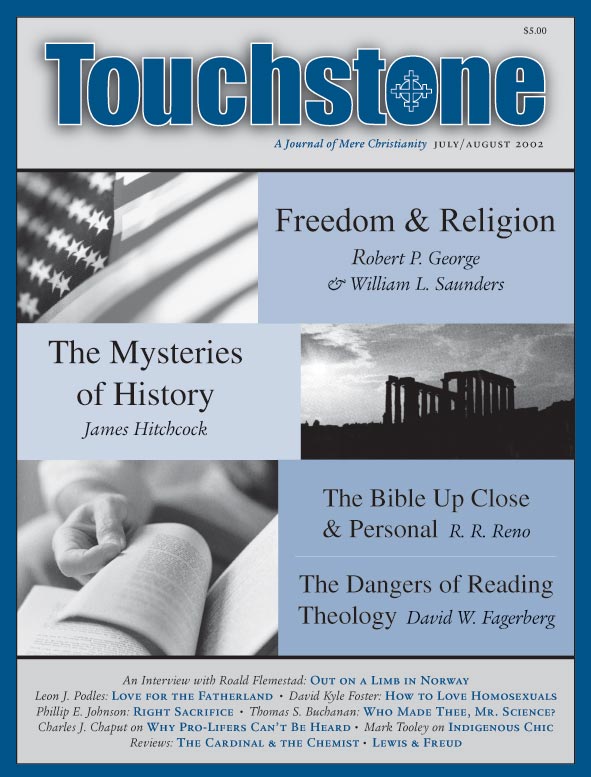“The Man, Jesus Christ ”
It is arguable that Psalm 8, which begins “O Lord, our Lord, how excellent is Your name in all the earth,” is the theologically richest of all the psalms. Two parts of it receive particular attention in the New Testament.
First, there is the early line: “Out of the mouths of babes and nursing infants You have perfected praise because of Your enemies—to confound both the adversary and the foe.” Jesus quotes this verse to his own adversaries and foes in Matthew 21:16, when he describes the joyful shouts of the children who welcomed his regal entrance into Jerusalem. This reference indicates the proper interpretive context of the psalm, which is the glorification of Jesus as King and Lord.
This is a psalm celebrating the revelation of the Father’s only begotten Son. Only the children, the “little ones,” are given to know the glory of God that shines on the face of Christ, for it is a vision concealed from the wise and prudent, the adversary and foe. Earlier in Matthew, there is our Lord’s prayer with respect to this concealment and revelation: “I thank You, Father, Lord of heaven and earth, that You have hidden these things from the wise and prudent, and have revealed them to babes. Even so, Father, for so it seemed good in Your sight. All things have been delivered to Me by My Father, and no one knows the Son except the Father. Nor does anyone know the Father except the Son, and the one to whom the Son wills to reveal Him” (11:25–27).
That same line of our psalm—“Out of the mouths of babes and nursing infants You have perfected praise because of Your enemies—to confound adversary and foe”—also tells the true meaning of the verse preceding it: “for Your magnificence is exalted above the heavens,” a verse traditionally interpreted with reference to the ascension and glorification of Jesus. For example, Gerhohus of Reichersburg commented: “Your magnificence, that is, Your Son, or his humanity, through which You are magnified, was exalted to a place above the heavens, when he ascended forty days after the resurrection.”
Which brings us to the second major point of attention in the New Testament’s interpretation of this psalm: the identity of the “man” or “son of man” spoken of almost immediately—“What is man that You are mindful of him, or the son of man that You visit him?” Both of the words for man are used here—man as male (Hebrew ’enosh and Greek aner), and man as human being (Hebrew adam and Greek anthropos). They are one and the same—the Man, the specific male human being who embodies in himself the whole race.
And just what is said of this Man? “You have made him a little lower than the angels, and You have crowned him with glory and honor. You have set him over the works of Your hands. You have put all things in subjection under his feet.” This is the Man, the same specific male human being, made a little lower than the angels, who has now become Lord of both heaven and earth.
Our earliest extant Christian interpretation of these lines reads as follows: “For in that He put all in subjection under him, He left nothing that is not put under him. But now we do not yet see all things put under him. But we see Jesus, who was made a little lower than the angels for the suffering of death, crowned with glory and honor, that He, by the grace of God, might taste death for everyone” (Hebrews 2:8–9).
This is not a psalm, then, about humanity abstractly considered; according to the second chapter of Hebrews, it is a psalm concerned with that defining model and prototype of humanity, Jesus, Lord and Christ, Suffering Servant and Savior of the world, merciful and faithful High Priest, now exalted to the right hand of the majesty on high, and bringing many sons unto glory, not ashamed to call them brethren, tasting death on their behalf, Himself a partaker of their flesh and blood and fear.
The saving Christ is the proper interpretation of this psalm, just as he is the proper interpretation of humanity. Christ is the defining Man of our being and our destiny. Alpha and Omega (Revelation 1:8,11; 21:6; 22:13), Christ is the beginning and the end, the normative principle and the final validation, of history, of language, and of culture. In Christ alone, crowned with glory and honor, is God’s name exalted above the heavens.
Patrick Henry Reardon is pastor emeritus of All Saints Antiochian Orthodox Church in Chicago, Illinois, and the author of numerous books, including, most recently, Out of Step with God: Orthodox Christian Reflections on the Book of Numbers (Ancient Faith Publishing, 2019).
subscription options
Order
Print/Online Subscription

Get six issues (one year) of Touchstone PLUS full online access including pdf downloads for only $39.95. That's only $3.34 per month!
Order
Online Only
Subscription

Get a one-year full-access subscription to the Touchstone online archives for only $19.95. That's only $1.66 per month!
bulk subscriptions
Order Touchstone subscriptions in bulk and save $10 per sub! Each subscription includes 6 issues of Touchstone plus full online access to touchstonemag.com—including archives, videos, and pdf downloads of recent issues for only $29.95 each! Great for churches or study groups.
Transactions will be processed on a secure server.
more from the online archives
calling all readers
Please Donate
"There are magazines worth reading but few worth saving . . . Touchstone is just such a magazine."
—Alice von Hildebrand
"Here we do not concede one square millimeter of territory to falsehood, folly, contemporary sentimentality, or fashion. We speak the truth, and let God be our judge. . . . Touchstone is the one committedly Christian conservative journal."
—Anthony Esolen, Touchstone senior editor










